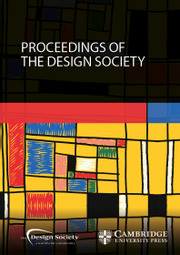Article contents
DIAGNOSIS OF DEVELOPMENT OPPORTUNITIES FOR REFRIGERATION SOCIO-TECHNICAL SYSTEM USING THE RADICAL INNOVATION DESIGN METHODOLOGY
Published online by Cambridge University Press: 27 July 2021
Abstract
A refrigerant system (like that of a supermarket) is a complex system if we consider all the stakeholders throughout its lifecycle phases (use, maintenance, technological update, end of life). The lack of stakeholders' interaction during the design and other lifecycle stages of such a system generates issues and leads to sub-optimal system performances. We used the RID methodology to identify the main areas for improvement for these activities related to the refrigerant system. It is precisely designed to analyze, within the scope of activity, the major stakeholders' problems (user profiles) during lifecycle phases (use situations) to deduce areas for improvement (value buckets). Therefore, we built a process of interviews and data collection on existing practices to feed into a RID model. The first results are an archetypal description of the actors and problems encountered according to the lifecycle phases. The second part is a prioritized mapping of the areas to improve despite a certain number of known available solutions but proven insufficient.
Information
- Type
- Article
- Information
- Creative Commons
- This is an Open Access article, distributed under the terms of the Creative Commons Attribution-NonCommercial-NoDerivatives licence (http://creativecommons.org/licenses/by-nc-nd/4.0/), which permits non-commercial re-use, distribution, and reproduction in any medium, provided the original work is unaltered and is properly cited. The written permission of Cambridge University Press must be obtained for commercial re-use or in order to create a derivative work.
- Copyright
- The Author(s), 2021. Published by Cambridge University Press
References
- 6
- Cited by

